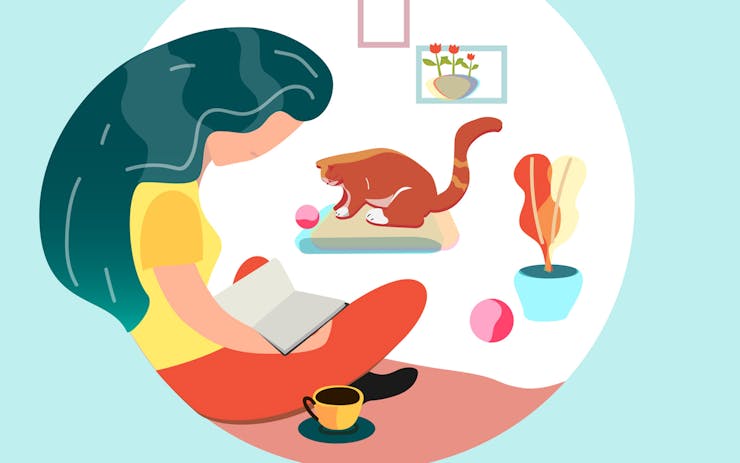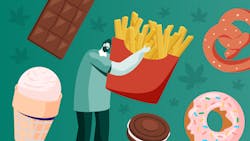A Canadian study published last month in the journal Drug and Alcohol Review looked for differences between people who consume cannabis socially versus those who consume cannabis solo, and found:
Compared to individuals reporting their most recent cannabis-using occasion as social, solitary users were significantly more likely to screen positive for psychosis, endorse more symptoms of cannabis abuse/dependence, report using cannabis to cope, and use cannabis on more days within the previous 30 days.
In its own words, the study “sought to examine the extent to which the social context of cannabis use is related to patterns of use and associated harms.”
Harms, but What About Benefits?
Please note that this statement of purpose doesn’t even consider the possibility that there may be associated benefits to cannabis in addition to associated harms. In fact, Toni Spinella—a master’s student in psychology and neuroscience and the study’s lead author—seems to think anyone who uses cannabis for “coping” treads in dangerous waters.
The study's author seems to assume that anyone who uses cannabis for 'coping' treads in dangerous waters. But don't we all cope with something?
“It’s possible that they lack other coping strategies,” Spinella told the CBC. “If you’re alone, why are you using alone? That’s something that you might want to ask yourself and if you realize, ‘OK, I’m using alone because I’m sad tonight or I’m stressed,’ then maybe that’s a red flag that you should think more about.”
Fair enough, but a red flag compared to what other coping mechanisms? Whiskey? Junk food? Internet scrolling? Gambling? Binge watching? Xanax?
Is Solo Smoking Making Me Psychotic?
As for the idea that consuming cannabis alone might lead to psychosis, allow me to start by asking a couple of common sense questions:
- Is it possible that people with mental health conditions are more likely to use cannabis in an attempt to self-medicate that condition?
- Is it possible that people using cannabis to treat mental health conditions would be more likely to do so alone rather than in a social setting?
The answer to both questions is pretty clearly yes.
Studies have shown that cannabis and cannabinoids can improve the symptoms of schizophrenia, PTSD, depression, anxiety, and other mental health conditions. And if you’re using cannabis to treat one of these conditions, doesn’t that seem like something you’re more likely to do at home with some frequency (compared to someone who smokes weed maybe once a month whenever it’s offered to them at a party)?
A Link Is Not a Cause
So while there may indeed be a correlation between psychosis and getting high alone, that’s a far cry from causation. Even the study’s author admits this. That’s why the CBC had to use a fudge term in its otherwise alarming headline:
Getting High Alone Linked to Psychosis, Dependence, Study Suggests
Can you can spot the fudge term?
Trick question. There are two of them: linked to and suggests.
Linked to means there’s no actual evidence to show that cannabis causes psychosis. Rather, someone with psychosis may be more likely to use cannabis than someone without psychosis.
Suggests means that even the evidence showing a “link” between the consumption and the medical condition is pretty paltry.
In Defense of Crutches
Toni Spinella’s aversion to using cannabis as a coping mechanism reminds me of a joke by Doug Benson, a longtime cannabis comedian and the host of Getting Doug With High.
Some people say marijuana is a crutch. Yeah. Crutches help people walk.
Shop highly rated dispensaries near you
Showing you dispensaries nearSomeone should tell Spinella that while we’d all like to live in a world where nobody ever gets stressed out or feels sad, that just ain’t happening. In the meantime, we need to find relatively healthy ways to cope.
A Therapeutic Option
Even if you live the life of a fully-optimized self-actualizing perfect person, you’re still going to be touched by trauma, depression, and anxiety—all of which can be treated with cannabis, a therapeutic option that’s demonstrably safer and less habit-forming than pharmaceutical drugs.
Cannabis has even been shown to help those suffering from loneliness itself, which the medical establishment increasingly sees as a real and growing epidemic. A recent study by Cigna, a health insurance company, found that a full 47 percent of Americans often feel lonely or left out. Thirteen percent say not one person knows them well. This has serious health consequences.
Loneliness as a Public Health Issue
In 2010, researchers at Brigham Young University published a groundbreaking study that showed chronic loneliness can take about 15 years off of a person’s life expectancy—roughly the same impact as obesity, or smoking nearly a pack of cigarettes per day.
But the good news is cannabis can greatly diminish the negative impacts of loneliness.
In 2013, researchers at the University of Kentucky published findings from a study that asked, “Can marijuana reduce social pain?” The answer was yes:
Marijuana buffered the lonely from: negative self-ratings of self-worth and mental health, depression over time, and even distress following exclusion… Marijuana has been used to treat physical pain, and the current findings suggest it may also reduce emotional pain.
Again, the researchers make clear that cannabis also has potential harms. And that coping with loneliness is not the same as overcoming it.
Put another way: You don’t want to use crutches for the rest of your life, but it’s better than trying to walk on a broken leg
You Don’t Have to Be Lonely to Be A Lone Stoner
“The Lonely Stoner seems to free his mind at night.”— Kid Cudi
We’ve already pointed out that Toni Spinella’s research ignores the considerable evidence that cannabis may be a therapeutically beneficial treatment for someone dealing with loneliness and depression. But she also fails to recognize that a relatively healthy person may find significant benefit from a little alone time with the bong.
I don’t have a study to back me up here, but I do speak from personal experience when I say that just as getting high together can help two or more people connect in a profound or at least interesting way (i.e. “get on the same wavelength”), cannabis can also help us connect with our own authentic selves.
Enlighten Up Yourself
“When you smoke the herb,” Bob Marley once said, “it reveals you to yourself.”
What’s revealed is not always flattering, but even a difficult realization about one’s self can yield helpful insights and spur true psychological growth.
Again, I can’t cite a study for this since most cannabis research continues to ignore the plant’s benefits, but I can call in an expert witness: Famed astronomer Dr. Carl Sagan, best known as the host of Cosmos, a 13-part exploration of far-out space science that became the most widely watched series in the history of American public television.

Astronomer Carl Sagan, professor of astronomy and space science at Cornell University, was one of the first scientists to speak out about the positive properties of cannabis. (AP Photo/Lennox McLendon)
Sagan contributed an anonymous essay to Marijuana Reconsidered (1971), a book written by eminent cannabis researcher Dr. Lester Grinspoon, one of Sagan’s closest friends. Identified only as Mr. X., Sagan explained that his support for ending cannabis prohibition was not just political, but also deeply personal.
He found real value in using cannabis introspectively:
Sometimes a kind of existential perception of the absurd comes over me and I see with awful certainty the hypocrisies and posturing of myself and my fellow men. And at other times, there is a different sense of the absurd, a playful and whimsical awareness… that we spend a lifetime being trained to overlook and forget and put out of our minds.
A sense of what the world is really like can be maddening; cannabis has brought me some feelings for what it is like to be crazy, and how we use that word ‘crazy’ to avoid thinking about things that are too painful for us.
There is a myth about such highs: the user has an illusion of great insight, but it does not survive scrutiny in the morning. I am convinced that this is an error, and that the devastating insights achieved when high are real insights; the main problem is putting these insights in a form acceptable to the quite different self that we are when we’re down the next day.
Tips for a Solo Flight
As the author of a book called How to Smoke Pot (Properly), I feel compelled to close with a few practical thoughts on how to optimize your solitary cannabis experiences.
- Before you get stoned, decide what you’re going to do after you get stoned, and then do it.
- If possible, get out into nature before you spark up. This is particularly good advice if you’re battling depression.
- Turn off your phone and instead utilize an archaic technology known as a “notebook” to jot down all your brilliant highdeas before they slip away.
In his hit song “Day and Night,” Grammy winner Kid Cudi introduced The Lonely Stoner, an alter-ego based on a period in his life when he spent a lot of time engaged in what jazz musicians used to call woodshedding. Which back in the day literally meant spending a few months holed up in a woodshed practicing your instrument nonstop. Often with the help of a little reefer to keep in the flow.
You probably don’t have a few months to spare right now to fully focus on a creative pursuit, but why not try it for a day? Find a time and place to be alone for 24 hours without distraction, track down some strains known to boost creativity, and set the intention of creating or learning something new.
Then drop a note in the comments and let us know how it went.





